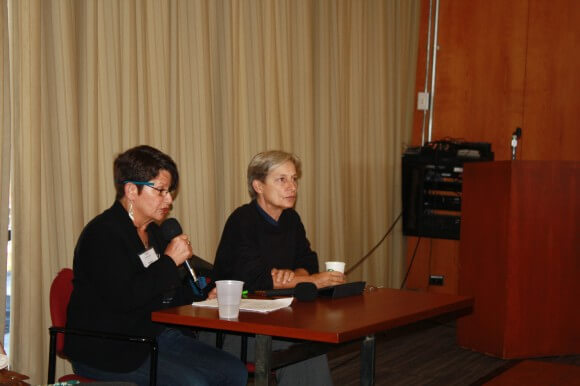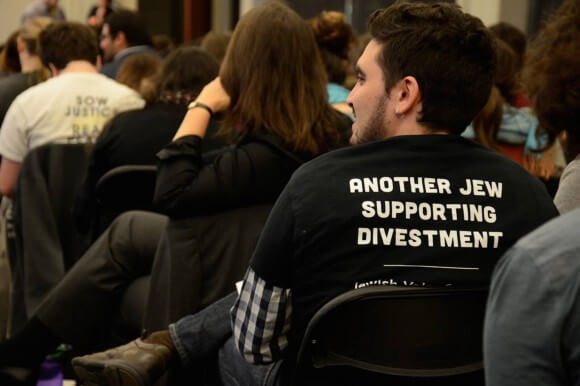Two years ago, Harvard’s Hillel chapter clamped down on dissent. The Hillel-affiliated Progressive Jewish Alliance planned an event with the Palestine Solidarity Committee to bring two anti-occupation Jews to America’s most elite institution. It would be under the roof of Hillel, the well-endowed organization that is at the center of Jewish life on college campuses.
Hillel leaders and donors pushed back hard because the Palestine Solidarity Committee supported the boycott, divestment and sanctions (BDS) movement–a violation of Hillel International’s guidelines for what speakers they can host. Hillel’s leadership said that as long as the Palestine solidarity group co-sponsored the talk, it could not be held under their roof.
But instead of extinguishing dissent, Hillel’s move gave birth to a new movement, and a new Jewish community: Open Hillel. Created in the wake of the Harvard controversy, Open Hillel has grown around the country. Open Hillel aims to open up Jewish institutions, including Hillel and others, to frank discussion about the occupation with no red lines. Three Hillel chapters on liberal college campuses have declared themselves to be “open”–rejecting Hillel International’s guidelines that keeps out speakers who support BDS, among other restrictions.
Last weekend, hundreds of people, most of them young Jewish students, gathered at Harvard for Open Hillel’s first conference. They created a space where open dissent on Israel is welcomed and where conversation and debate is the norm. At the heart of the Open Hillel network is a conviction that Hillel should be a place that welcomes all Jews–not just those who follow the establishment line on Israel.
In a statement released as the conference kicked off, Rachel Sandalow-Ash, a Harvard senior, said hundreds of Jewish students convened “to create the Jewish community that we want to see–and to organize together to create change.”
College students, some wearing kippahs, others keffiyehs, filtered in and out of rooms with workshops on Palestine, race and gender in the Jewish community and how to challenge the power of donors.
The conference landed as more Jewish establishment leaders openly worry about young Jews’ disaffection from both established religious spaces and Israel. The assault on Gaza, on the minds of many Open Hillel attendees, has intensified this worry, with new Jewish groups like If Not Now popping up and older groups like Jewish Voice for Peace riding a wave of anger over the Israeli attacks. For Emily Unger, a Harvard student who graduated last year, the answer to the Jewish community’s angst over the future of American Jewry can be found in Open Hillel.
“We are running entirely on the passion and devotion of young Jews who are banging on the doors of the American Jewish community begging to be let in,” she said in a speech at the closing plenary. “For all the Jewish professionals out there who have been sitting around scratching your heads trying to figure out how to engage young Jews: here’s your answer.”

Judith Butler, the famous scholar, was one of the stars of the Open Hillel conference. Shut out of places like the Jewish Museum in New York for her views on Israel, Butler was warmly welcomed at Open Hillel. “There is no Jewish consensus on Israel…I mean, it’s dangerous to have dinner with a bunch of Jewish people right now, I’m telling you,” she said to laughter. “By coming here you do not have to agree to any particular view. But you do agree to hear them, to voice your views about them without the fear of censorship or retaliation.” Butler added that Open Hillel attendees were “in the midst of creating new communities of belonging.”
The space of belonging Open Hillel has created is far from a monolith. Open Hillel organizers say that is the point of their organization. Jewish Voice for Peace and J Street members are organizing, and debating, together. Students for Justice in Palestine (SJP) members manned a table during the lunch hour’s “organization fair,” and some SJP members participated in the conference. The discursive battle over Israel was a centerpiece of the conference, though it took place largely on the left. (Right-wing groups were invited to the conference, but they did not show up.) While Open Hillel’s lack of consensus on action and boycotts of Israel rankles some left-wing activists, organizers of the conference say that having open conversation is a victory in itself. And those on the left flank of Open Hillel hope that having open debate on the Israeli occupation will swell their ranks.
Open Hillel has also become a space for deeply engaged Jews to work out evolving feelings on Israel. Many of the attendees are in the beginning phase of activism on Israel/Palestine. But they told me they have found a space of belonging in Open Hillel. Some have transformed from committed Zionists to critics of Israel. Others still consider themselves Zionists, albeit of the liberal sort.
Conference attendees caught a glimpse of the future of Open Hillel at the closing plenary, where organizers announced plans to step up pressure on Hillel. One plan is to declare more Hillel chapters “open” around the country. And Open Hillel organizers announced a new campaign to bring Jewish civil rights movement veterans–like Freedom Summer participants Dorothy Zellner, Ira Grupper and Larry Rubin, who spoke at the conference–to Hillel chapters.
Zellner and Grupper are outspoken critics of Israel, and cross Hillel International’s “red lines” that determine which speakers they can host. Open Hillel organizers say that Hillel-affiliated students will invite these activists to speak. That move will force Hillel’s leadership to turn away Jewish civil rights veterans–or open up their space to critics of Israel who are revered in the Jewish community.



“For all the Jewish professionals out there who have been sitting around scratching your heads trying to figure out how to engage young Jews: here’s your answer.”
Strictly as a tangent, I love the un-ironic use of “Jewish professionals” in that sentence.
The two students with the black tees have my admiration. They are doing, in addition to their studies, exactly what students should be doing. All the emphasis on what job will students get after graduation obscures the fact that students have a job as college students, to apply what they have learned in an analysis of social issues, to push conversations beyond the narrow bounds in which they are invariably framed. The discussions at Open Hillel would never happen in the MSM because they are silently but intentionally excluded. This conference and others like it are grounds for optimism.
Good.
And I hereby appoint the World Wide Congress of the Others as the official non partisan referees of the Open Hillels vr the Closed Hillels fight.
As out first ruling we are calling foul on Closed Hillel for this rules violation of black listing objectors to the Israeli occupation of Palestine.
Confronting Campus Scourge of Anti-Israel Venom
There’s Nothing Wrong With Keeping Track of Biased Professors
Read more: http://forward.com/articles/207179/confronting-campus-scourge-of-anti-israel-venom/#ixzz3G8pNJNSu
It’s the old difference between teaching how to think versus what to think, sometimes used by Anglicans to tout their prep schools over Catholic schools.
It also reminds of the adage, know thine enemy. Even if you regard Palestinians as your enemy, nothing but benefit comes from getting to know them better.
In terms of negotiation, knowing your opponent’s interests is always key.
One can only conclude that certain aspects of the Jewish establishment have committed themselves to stupid thought control as their strategy for dealing with fall-out from Israel’s policies. And to take that strategy to elite academic settings! What could go wrong? How did these people come to power in the first place? How do they get replaced?
Sounds like it could be called BDS Hillel that is willing to talk to nonBDS Jews, who by the very nature of the BDS Hillel will only be those who are on the left of Zionism. Maybe there is more interesting discussion in this overlap than there is in the tent of Hillel. But actually there is plenty of space to the right of BDS to make for interesting discussions as well in the other tent. Doesn’t strike me as false to have two tents, and the only ones who can participate in both tents are those on the left of Zionism.